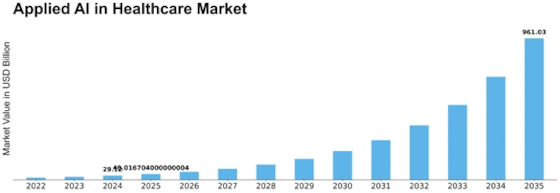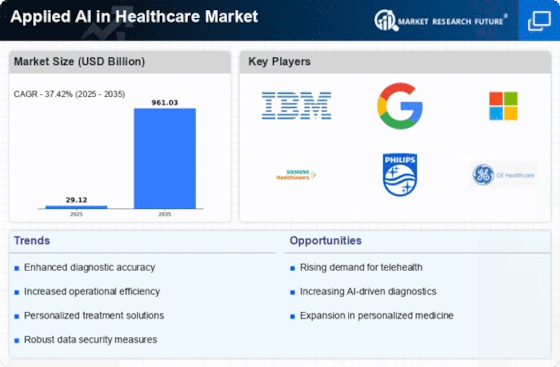Applied Ai In Healthcare Size
Applied AI in Healthcare Market Growth Projections and Opportunities
The dynamics of Applied AI in healthcare market have been profoundly affected by the industry’s pursuit for improved patient outcomes, operational efficiency and transformative potential of advanced technologies. There are many uses of Applied AI in Healthcare that include medical imaging, diagnostic support, drug discovery, personalized medicine and patient engagement. Various key drivers account for the market dynamism of this particular area reflecting the ongoing evolution of healthcare practices and searching for innovative solutions to complex challenges.
One of the main drivers shaping the market dynamics of Applied AI in Healthcare is the push for better diagnostic accuracy and treatment efficacy. For example, AI applications can analyze medical images or data from patients along with genomic information that helps healthcare people to identify diseases, predict response to treatments and personalize care plans. This involves using Artificial Intelligence to process large volumes of data, detect subtle patterns as well as provide real-time insights which enable better clinical decisions making processes leading to early detection of diseases as well as treatment optimization. It is a quest for better outcomes that has driven incorporation of AI technologies into healthcare settings.
Inter alia, development in telemedicine and remote patient monitoring significantly influences the market dynamics regarding Applied AI in Healthcare. As such, artificial intelligence-powered solutions help with remote diagnostics; teleconsultations; and continuous monitoring of patients’ health conditions when health care delivery extends beyond traditional settings. In order to facilitate virtual care, disease management and preventive interventions, such systems work together with analysis on patient-generated data among other sources like wearable devices including electronic health records (EHRs). By incorporating AI into telehealth it not only improves access but also makes sure that there is personalized and patient-centered approach both.
In addition demand for operating efficiency/ costs containment are major factors which influence how markets operate under applied Artificial Intelligence (AI) implementation context. Such solutions are driven by automation of administrative tasks within organizations providing medical services otherwise known as healthcare organizations thereby streamlining workflow processes while optimizing resource allocation accordingly. Operation data is analyzed by machine learning algorithms to identify areas for improvement, predict cases of patients’ admissions and enhance resource utilization. So, this helps in improving the operational efficiency through cost saving and reduced administrative workload as well as increased healthcare performance generally.
The competitive landscape in Applied AI in Healthcare industry has led to a dynamic market with multiple technology providers offering differentiated solutions that range from diagnostic support tools to population health analytics platforms. Differentiation often comes in the form of making specialized applications that can work together with those already existing within health systems or conforming to regulatory standards. Competitive forces drive innovation like never before, as AI providers strive to meet new needs of healthcare providers resulting into solutions which improve clinical workflows, patient care and organizational efficiency.



















Leave a Comment